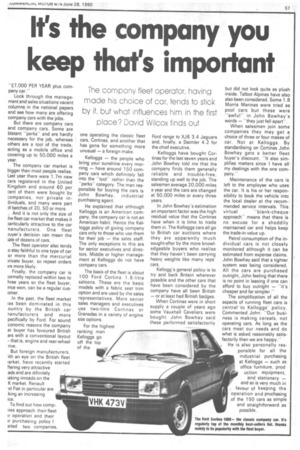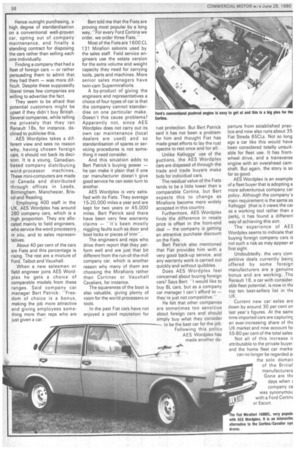Ws the company you keep that's important
Page 59

Page 60

If you've noticed an error in this article please click here to report it so we can fix it.
"E7,000 PER YEAR plus company car."
Look through the management and sales situations vacant columns in the national papers and see how many are offering company cars with the jobs.
But there are company cars and company cars. Some are blatant "perks' and are hardly necessary for the job, whereas others are a tool of the trade, acting as a mobile office and covering up to 50,000 miles a year.
The company car market is bigger than most people realise. Last year there were 1.7m new cars registered in the United Kingdom and around 60 per ent of them were bought by aompanies, not private iniividuals, and many were part )f batches of 20, 50 or more. _ And it is not only the size of :he fleet car market that makes it )articularly attractive to the car nanufacturers. One fleet )uyer's decision can mean the ;ale of dozens of cars.
The fleet operator also tends o stay faithful to one type of car ar more than the mercurial srivate buyer, so repeat orders ire more likely.
Finally, the company car is lormally replaced within two to hree years so the fleet buyer, ince won, can be a regular cusomer.
In the past, the fleet market as been dominated in this ountry by the British car nanufacturers and more pecifically by Ford. For sound conomic reasons the company ar buyer has favoured British ars with a conventional layout -that is, engine and rear-wheel rive.
But foreign manufacturers, ith an eye on the British fleet larket, have recently started ifering very:attraCtive ads and are difinitely ieking inroads on the K market. Renault id Fiat in particular are king an increasing ice.
To find out how complies approach their fleet ir operation and their ir purchasing policy I sited two companies, one operating the classic fleet cars, Cortinas, and another that has gone for something more unusual — a foreign make.
Kelloggs — the people who bring your sunshine every morning — have around 150 company cars which definitely fall into the -tool" rather than the "perks" category. The man responsible for buying the cars is John Bowhay, industrial purchasing agent.
He explained that although Kelloggs is an American company, the company car is not an American habit. Hence the Kelloggs policy of giving company cars only to those who use them for their job — the sales staff. The only exceptions to this are for senior executives and directors. Middle or higher management at Kelloggs do not have company cars.
The basis of the fleet is about 100 Ford Cortina 1.6-litre saloons. These are the basic models with a fabric seat trim option and are used by the sales representatives. More senior sales managers and executives use two-litre Cortinas or Granadas in a variety of engine size options.
For the highest ranking men Kelloggs go off the top of the Ford range to XJ6 3.4 Jaguars and, finally, a Daimler 4.2 for the chief executive.
Kelloggs have bought Cortinas for the last seven years and John Bowhay told me that the company finds them generally reliable and trouble-free, standing up well to the job. The salesmen average 20,000 miles a year and the cars are changed at 50,000 miles or every three years.
In John Bowhay's estimation an important factor was the high residual value that the Cortinas have when it is time to trade them in. The Kelloggs cars all go to British car auctions where they are apparently much sought-after by the more knowledgeable buyers who realise that they haven't been carrying heavy weights like many reps' cars.
Kellogg's general policy is to try and back Britain wherever possible and the other cars that have been considered by the company have all been British — or at least had British badges.
When Cortinas were in short supply a couple of years ago some Vauxhall Cavaliers were bought. John Bowhay said these performed satisfactorily but did not look quite as plush inside, Talbot Alpines have also also been considered. Some 1.8 Morris Marinas were tried as pool cars but these were "awful" in John Bowhay's words — "they just fell apart".
When salesmen join some companies they may get a choice of three or four makes of car. Not at Kelloggs. By standardising on Cortinas John Bowhay gets a better fleet buyer's discount. "It also simplifies matters since I have all my dealings with the one company."
Maintenance of the cars is left to the employee who uses the car. It is his or her responsibility to book the vehicle into the local dealer at the recommended service intervals. This virtual "blank-cheque approach" means that there is no excuse for a shoddily maintained car and helps keep the trade-in value up.
Petrol consumption of the individual cars is not closely monitored although it can be estimated from expense claims. John Bowhay said that a tighter system was being considered. All the cars are purchased outright, John feeling that there is no point in leasing if one can afford to buy outright — "it's cheaper and far simpler."
The simplification of all the aspects of running fleet cars is central'to Kelloggs' policy. Commented John: "Our business is making cereals, not operating cars. As long as the cars meet our needs and do what is asked reasonably satisfactorily then we are happy.
, He is also personally responsible for all the industrial purchasing at Kelloggs — such as office furniture, prod uction equipment, and stationery — and so is very much in favour of keeping the operation and pruchasing of the 150 cars as simple and straightforward as possible. Hence outright purchasing, a high degree of standardisation on a conventional well-proven car, opting out of company maintenance, and finally a standing contract for disposing the cars rather than selling each one individually.
Finding a company that had a fleet of foreign cars — or rather persuading them to admit that they had them — was more difficult. Despite these supposedly liberal times few companies are willing to advertise the fact.
They seem to be afraid that potential customers might be upset if they didn't buy British. Several companies, while telling me privately that they ran Renault 18s, for instance, declined to publicise this.
AES Wordplex takes a different view and sees no reason why, having chosen foreign cars, it should not back its decision. It is a young, Canadianbased company distributing word-processor machines. These mini-computers are made in Canada and distributed through offices in Leeds, Birmingham, Manchester, Bristol and Reading.
Employing 400 staff in the UK, AES Wordplex has around 260 company cars, which is a high proportion. They are allocated mainly to field engineers, who service the word processors in situ, and to sales representatives.
About 40 per cent of the cars are Fiats and this percentage is rising. The rest are a mixture of Ford, Talbot and Vauxhall.
When a new salesman or field engineer joins AES Wordplex he gets a choice of comparable models from these ranges. Said company car manager Bert Patrick: "Freedom of choice is a bonus, making the job more attractive and giving employees something more than reps who are just given a car." Bert told me that the Fiats are proving most popular by a long way, "For every Ford Cortina we order, we order three Fiats."
Most of the Fiats are 1600 CL 131 Nlirafiori saloons used by the sales staff. Field service engineers use the estate version for the extra volume and weight capacity they need for carrying tools, parts and machines. More senior sales managers have twin-cam Supermirafioris.
A by-product of giving the engineers and representatives a choice of four types of car is that the company cannot standardise on one particular make. Doesn't this cause problems? Apparently nct, since AES Wordplex does not carry out its own car maintenance (local dealers are used) and so standardisation of spares or servicing procedures is not something it need consider.
And this situation adds to Bert Patrick's buying power — he can make it plain that if one car manufacturer doesn't give good service he can soon turn to another.
AES Wordplex is very satisfied with its Fiats. They average 15-20,000 miles a year and are kept for two years or 45,000 miles. Bert Patrick said there have been very few warranty claims — –it's been mostly niggling faults such as door and boot locks or pieces of trim".
The engineers and reps who drive them report that they perform well and are just that bit different from the run-of-the-mill company car, which is another reason why many of them are choosing the Mirafioris rather than Cortinas or Vauxhall Cavaliers, for instance.
The squareness of the boot is also valuable, giving plenty of room for the world processors or tools.
In the past Fiat cars have not enjoyed a good reputation for rust protection. But Bert Patrick said it has not been a problem for him and thought Fiat has made great efforts to lay the rust spectre to rest once and for all.
Unlike Kelloggs' use of the auctions, the AES Wordplex cars are disposed of through the trade and trade buyers make bids for individual cars.
The residual value of the Fiats tends to be a little lower than a comparable Cortina, but Bert expects this to change as Mirafioris become more widely accepted in this country.
Furthermore, AES Wordplex finds the difference in resale price is offset in the front-end deal — the company is getting an attractive purchase discount on the Fiats.
Bert Patrick also mentioned that Fiat provides him with a very good back-up service, and any warranty work is carried out quickly and without quibbles.
Does AES Wordplex feel concerned about buying foreign cars? Says Bert: "'l would like to buy BL cars, but as a company car manager I can't afford to — they're just not competitive.'" He felt that other companies are sometimes too sensitive about foreign cars and should simply buy what they consider to be the best car for the job Following this policy AES Wordplex has
made another de
parture from established practice and now also runs about 35 Fiat Strada 65CLs. Not so long ago a car like this would have been considered totally unsuitable for fleet use. It has frontwheel drive, and a transverse engine with an overahead camshaft. But again, the story is so far so good.
AES Wordplex is an example of a fleet buyer that is adopting a more adventurous company car policy. Although the company's main requirement is the same as Kelloggs' (that is it views the car as a working tool rather than a perk), it has found a differeni way of achieving this aim.
The experience of AES Wordplex seems to indicate that buying foreign company cars is not such a risk as may appear at first sight.
Undoubtedly, the very competitive deals currently beinc offered by some foreign manufacturers are a genuine bonus and are working. The Renault 18, a car with considerable fleet potential, is now in the top ten best-sellers list in the UK.
Current new car sales are down by around 30 per cent on last year's figures. At the same time imported cars are capturing an ever-increasing share of the UK market and now account foi 55-60 per cent of the total sales Not all of this increase it attributable to the private buyer
and the home fleet car marke. can no longer be regarded ar
the sole domair of the British manufacturers Gone are thE, days when company ca was synonyrnou with a Ford Cortinz or Escort.




































































































































